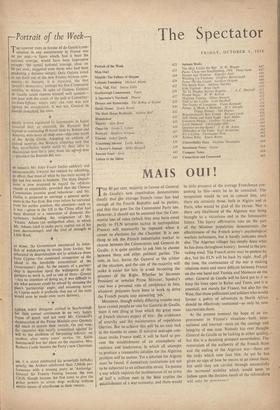MAIS 0111!
THE 80 per cent. majority in favour of General de Gaulle's new constitution demonstrates clearly that 4he average French 'voter has had enough of the FoUrth Republic and its parties, and that that goes for the Communist Party too. However, it should not be assumed that the Com- munist loss of votes (which they may have owed partly to FLN terrorist tactics in metropolitan France) will necessarily . be repeated when it conies to elections for the Chamber. It is one thing-.to ask the French' industrialist worker to choose between the Communists and General de Gaulle; it is quite another to ask him to choose between them and other political, parties. The vote, in, fact, leaves the General as the arbiter of the situation, and the size of the, majority will make it easier for hint to avoid becoming the prisoner of the Right. Whether he becomes President or remains Prime Minister, Sunday's vote was a personal vote of confidence in him, whatever pressures have been at work to drive the French people into answering 'yes.'
Moreover, though widely differing reasons may have caused people to vote for General de.Gaulle, there is one thing at least which the great mass of French electors expect of him : the avoidance of anarchy and-the maintenance of republican liberties. But to achieve this will be no easy task in the months to Come. If terrorist outrages con- tinue inside France itself, it will be hard to pre- vent the establishment of an atmosphere of violence and intolerance, in which all attempts to produce a reasonable solution for the Algerian problem will be useless. Yet a solution for Algeria must be found, if democratic institutions are not to be subjected to an unbearable strain. To pursue a war which requires the maintenance of an army of half a million men in the field implies the establishment of a war economy, and there would be little prospect of the average Frenchman con- senting to this—were he to be consulted. The temptation would be not to consult him, and there are certainly those, both in Algiers and in Paris, who would be glad of the excuse. Nor is there any likelihood of the Algerian war being brought to a victorious end in the foreseeable future. The heavy affirmative vote on the part of the Moslem- population demonstrates the effectiveness of the French army's psychological warfare techniques, but it hardly indicates much else. The Algerian villager has simply done what he has done throughout history : bowed to the pre- vailing wind. The French army may be present by day, but the FLN will be back by night. And, all the time, the continuance of the war is making relations more and more difficult between France on the one hand and Tunisia and Morocco on the other. General de Gaulle will be hard put to it to keep the lines open to Rabat and Tunis, and it is essential, not merely for France, but also for the West, that those politicians and soldiers who would favour a policy of adventure in North Africa should be effectively restrained—as only he now can restrain them.
At the present moment the hope of an im- provement in France's situation—both inter- national and internal—rests on the courage and integrity of one man. Nobody has ever thought General de Gaulle to be lacking in either quality, but this is a daunting prospect nevertheless. The restoration of the authority of the French State and the ending of the Algerian war—these are the tasks which now face him. As yet he has given no sign of how he means to go about them, but until they are carried through successfully the increased stability which would seem to follow upon the decisive result of the referendum will only be nrovicinn,1


















































 Previous page
Previous page